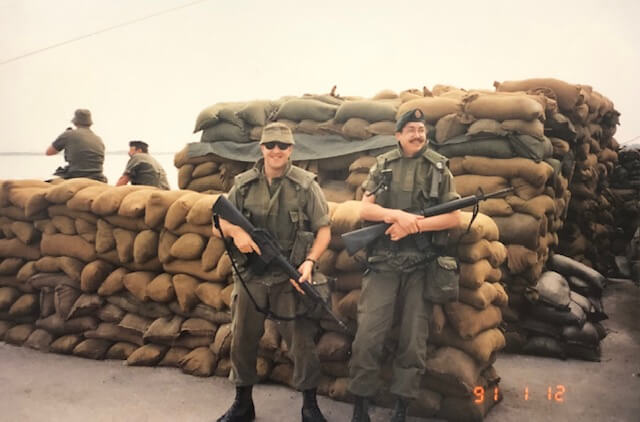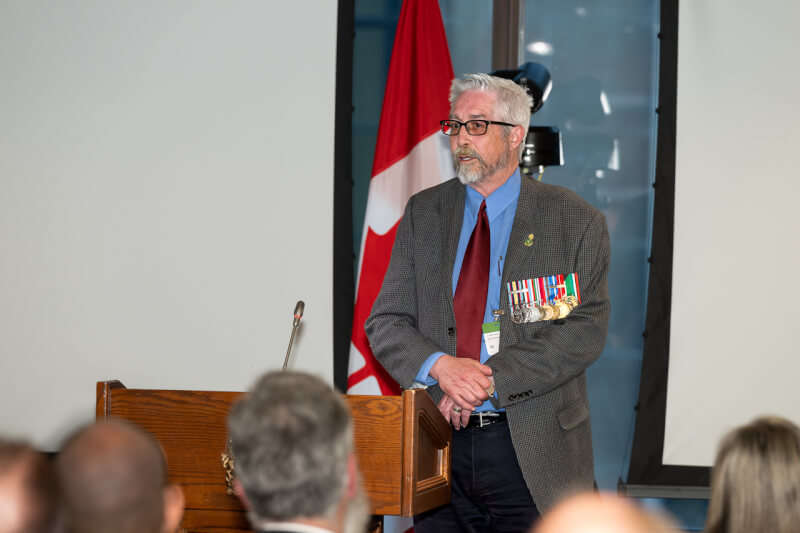
Mike McGlennon, now vice-president of the Persian Gulf Veterans of Canada Association, poses with a comrade during his deployment in the conflict in January 1991. [courtesy of Mike McGlennon]
“What is a war—and what does Canada consider a war?”
Such questions, and many more, come from former serviceman Mike McGlennon. Rhetorical though they might appear, they’re nevertheless questions that the vice-president of the Persian Gulf Veterans of Canada Association expects the federal government to address—and soon. Already, he adds, answers are well “past due.”
“War” is not in the organization’s name for a reason. Despite the deployment of at least 4,458 Canadian service personnel after Saddam Hussein’s invasion of Kuwait on Aug. 2, 1990, and despite those same military members later earning battle honours prior to the Feb. 28, 1991, ceasefire, none were legally recognized as “wartime service” veterans, instead attaining a “special duty area” designation.
McGlennon wants that to change, not only for former combatants of the Persian Gulf War, but those of other UN-led missions—not least the war in Afghanistan. One hurdle to overcome is the government’s definition of war, which states that territorial integrity, among other factors, must be threatened to meet the criteria.
The implications of the advocated redesignation extend far beyond symbolic value, although symbolism—be it inscribed in stone or etched in the hearts and minds of veterans—remains a critical component of the campaign.
“The medical insurance benefits are very different between war veterans and non-war veterans,” explains McGlennon. “There are things the wartime guys get that the rest of us just don’t.”
No Canadian service members were killed in combat during the conflict. However, scores returned home with what became known as Gulf War syndrome (or illness), which manifests in a wide-ranging cluster of symptoms that include chronic fatigue, headaches, dizziness, respiratory disorders, memory problems, and more.
Moreover, McGlennon argues, the fact that these veterans participated in combat in what was an active war zone warrants legislative changes, a consideration that both the Liberal and Conservative parties previously pledged to review during the 2025 general election. With 2026 marking 35 years since the end of the war, countless former service personnel hope that reform is still on the agenda.
McGlennon spoke to Legion Magazine about what that reform should look like.

Mike McGlennon speaks to MPs in May 2023. He has been campaigning for years to have Canada officially recognize the “wartime service” of veterans of the Persian Gulf War. [courtesy of Mike McGlennon]
On the historic precedent for change
Canada [through Britain] declared war on Germany in 1914, and again [autonomously] in 1939, followed by Japan in 1941. When you declare war on a country, it’s rather obvious that you’re at war, and when our military members got on a boat and went overseas to serve, they were deemed “war veterans” that first day, that first minute.
Since 1945, Canada has treated every deployment—Korea inclusive—as non-war. Ultimately, Korean veterans came home to Canada and fought to be considered war veterans, which didn’t happen until the 1980s. For the merchant navy crews [of WW II], it ended up being a much more difficult route. They got their wartime service designation in the 1990s, so about 45 years later. I am now on the same journey for Canada’s Gulf War veterans.
Why do I think I should be a wartime service veteran? Just look at Korea. That was a Chapter VII [UN] mission to liberate the country, even if that didn’t quite happen in full. We also participated in a Chapter VII [UN] mission. They participated in a multinational coalition force. We were involved in a multinational coalition force.
I’m legally identical to Korea [veterans]. The precedent has been set.
Then there are battle honours, which are normally only presented to wartime units. Battle honours have been issued to Persian Gulf War units, to Afghanistan units, to Kosovo units and to Libya units. Again, citing precedence, why are veterans of the Boer War, First World War, Second World War and Korea—where battle honours were likewise awarded—all considered war veterans, and so many others aren’t?
On advocating for change
Canada has a track record of treating its wartime service vets differently from special duty area vets, particularly with commemoration and medical insurance.
This fiscal year, Veterans Affairs Canada approved up to $25,000 per activity that would support commemoration of the country’s Persian Gulf War service, highlighting the 35th anniversary coming up [in 2026]. I’m hoping that a wartime designation will ensure that we receive funding for many more years, as I’d like to be pushing for inclusion on a lot of cenotaphs across Canada. The Persian Gulf War isn’t on too darn many of them. I’m willing to bet that Libya and Kosovo aren’t on too darn many of them. Even Afghanistan isn’t on too darn many—or enough of—them.
Afghanistan is now, of course, included on the National War Memorial—emphasis on “war.” Afghanistan is not [legally identified as] a war, but here it is on Canada’s National War Memorial. It should stay there, it’s right that it should be there, but it also means we’ve got one special duty area mission added at the expense of others. I just want to add the Persian Gulf War. I want to add Kosovo. I want to add Libya.
So, how does Canada fix these issues, and more?
It would have to be the prime minister, or maybe the minister of national defence, who stands behind a microphone during the 35th anniversary next year and makes an announcement to do with the bill [to reclassify special duty service as wartime service]. But, then it’s a case of acting on it. Don’t get me wrong—I’d be grinning like a Cheshire cat if some kind of a substantive announcement was made during the anniversary, and between then and now, that’s exactly what I’ll be asking for.
I’m 67 years old. I should be retired on a beach somewhere, but here I am.
Because somebody’s got to do it.
This abridged interview has been edited for brevity and clarity.
Advertisement




















